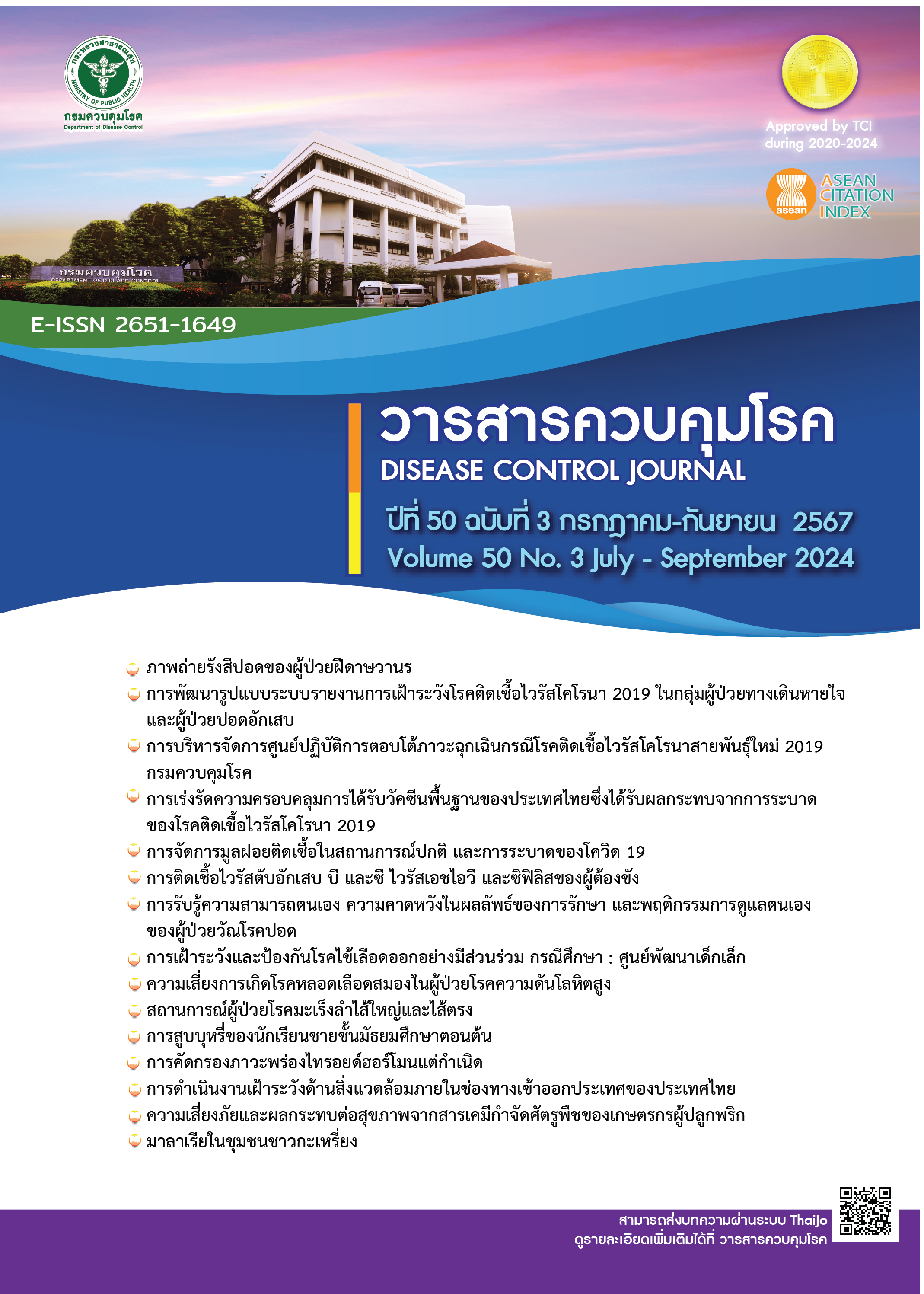Effectiveness of self-care promotion program on self-efficacy, expectations for the treatment outcomes and self-care behaviors of pulmonary tuberculosis patients in Mukdahan Province
DOI:
https://doi.org/10.14456/dcj.2024.38Keywords:
self-care promotion program, self-efficacy, expectation for the treatment outcomes, self-care behaviors of pulmonary tuberculosis patientsAbstract
This quasi-pre-post experiment and control research was conducted to evaluate the effectiveness of a self-care promotion program on self-efficacy, expectations for treatment outcomes, and self-care behaviors of pulmonary tuberculosis patients. Data were collected using a questionnaire from a total of 74 patients newly diagnosed with all types of pulmonary tuberculosis undergoing treatment at a hospital in Mukdahan Province. Patients were divided into an experimental group of 37 people and a comparison group of 37 people. The experimental group participated in activities according to the self-care promotion program for a period of 8 weeks, divided into 3 phases with 5 activities: Phase 1, the process of creating awareness of “Health Consciousness” consisting of 2 activities; Phase 2: knowledge exchange process and motivation “Toward Golden Health” consisting of 2 activities; and Phase 3: Monitoring and evaluation of effectiveness consisting of 1 activity. Data were collected using questionnaires. Intra-group comparison was made for self-efficacy perception, expectations for treatment outcomes, and self-care behaviors using the paired sample t-test and inter-group comparison was made using the independent sample t-test at the significance level of 0.05. The research results found that after the study the experimental group had a better changes of the average scores from baseline of self-efficacy, expectations for the treatment outcomes, and self-care behaviors than the comparison group (p-value<0,001) . Therefore, TB clinic staff is suggested to apply the self-care promotion program for TB patients to encourage patients on awareness the importance of receiving continuous treatment and to develop expectations for treatment results so that the patients could have better self-care behaviors.
Downloads
References
World Health Organization. Global tuberculosis report 2021. Geneva: World Health Organization; 2021.
Ministry of Public Health (TH), Department of Diseases Control, Tuberculosis Division. Report on the situation and surveillance of tuberculosis in Thailand [Internet]. [cited 2021 Mar 31]. Available from: https://www.tbthailand.org/download/form/ (in Thai)
Mukdahan Provincial Public Health Office. NTIP tuberculosis report 2021 [Internet]. [cited 2021 Sep 22]. Available from: https://ntip-ddc.moph.go.th/uiform/MainFeedSummary.aspx (in Thai)
Bandura A. Self-efficacy: The exercise of control. New York: W.H. Freeman; 1997.
Fisher WA, Fisher JD, Harman J. The information-motivation behavioral skill model: A general social psychological approach to understanding promoting health behavior. In: Suls J, Wallston K, editors. Social psychological foundation of health and illness. 1th ed. Malden: Blackwell 2003;82-106.
Krutsiri U. Effects of health promotion program on knowledge, self-efficacy, and self-care behaviors among new pulmonary tuberculosis patients, Banpong Hospital. Journal of Research for Health Improvement and Quality of Life 2021;1(3):24-34. (in Thai)
Somsorn S, Pichayapinyo P, Lagampan S. Effects of information, motivation and behavioral skills model with video observed therapy program among new pulmonary tuberculosis patients in Nonthaburi Province. Journal of Health and Nursing Research 2022;38(1):241-53. (in Thai)
Cohen JM, Uphoff NT. Rural development participation: Concepts and measures for project design, implementation and evaluation. New York: Rural Development Committee. The Rural Development Committee Center for International Studies, Cornell University Rural Development Monograph; 1977.
Mukarsa S. Effects of a health promotion program by applying the theory of empowerment in new smear positive pulmonary tuberculosis patients. Journal of Medicine and Health Sciences 2017;24(1):13-27. (in Thai)
Noorratri E, Margawati A, Dwidiyanti M. Improving self-efficacy and physical self-reliance of patients with Pulmonary Tuberculosis through mindfulness. Nurse Media J Nurs 2016;6(2):81-90.
Lim R, Semitala F, Atuhumuza E, Sabiti L, Namakula-Katende J, Muyindike W, et al. Patient choice improves self-efficacy and intention to complete tuberculosis preventive therapy in a routine HIV program setting in Uganda. Plos one 2021;16(2):e0246113.
Singchui W. Effectiveness of protection motivation application program on TB prevention behavior of caregiver. Journal of Public Health Nursing 2013;27(3):14-26. (in Thai)
Prasansueb P. Effects of group process and social supports on treatment of pulmonary tubercular patients at the tuberculosis clinics, Maha Chana Chai Hospital and Kho Wang Hospital in Yasothon Province. Mahasarakham University 2009. (in Thai)
Pasurakul S. Effects of a self-regulation program and social support on attitude toward treatment, self-care behavior and tuberculosis treatment success rate in pulmonary tuberculosis patients. The Journal of Faculty of Nursing Burapha University 2023;20(4):57-67. (in Thai)
Downloads
Published
How to Cite
Issue
Section
License
Copyright (c) 2024 Disease Control Journal

This work is licensed under a Creative Commons Attribution-NonCommercial-NoDerivatives 4.0 International License.
Articles published in the Disease Control Journal are considered as academic work, research or analysis of the personal opinion of the authors, not the opinion of the Thailand Department of Disease Control or editorial team. The authors must be responsible for their articles.






